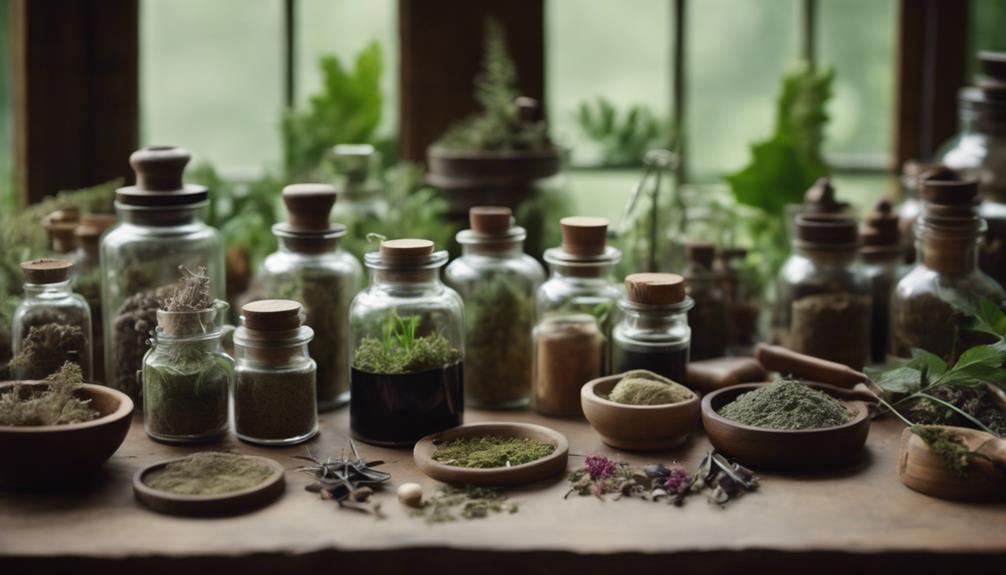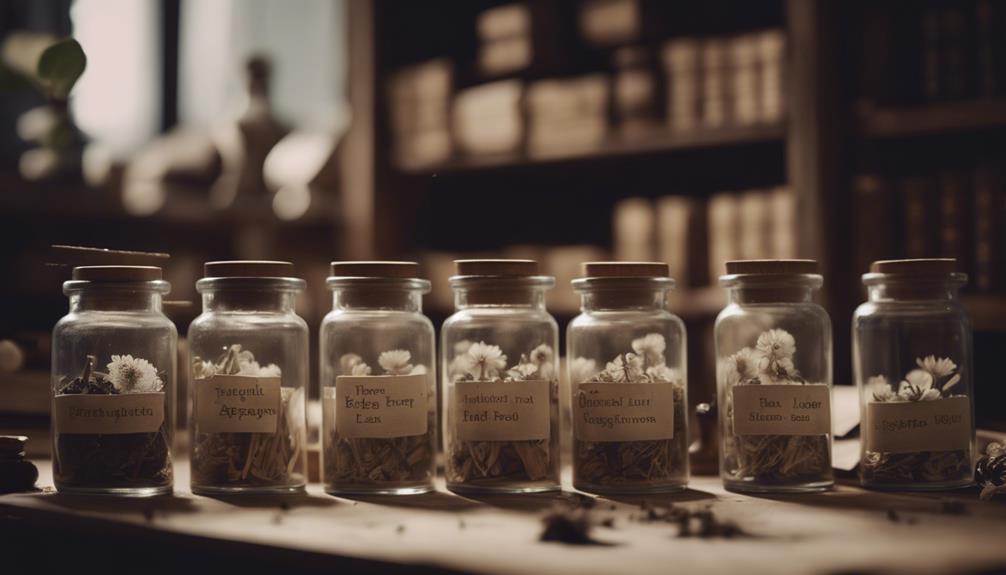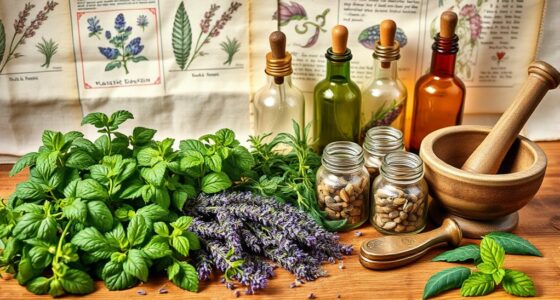As we consider a career in herbalism, we must weigh several important factors. First, we'll define our career path, choosing from roles like healers, educators, or entrepreneurs. Next, we'll select a study option that offers a well-rounded education, hands-on experience, and meets professional requirements. We'll develop practical skills, build a strong foundation in herbal knowledge, and cultivate local herbs for wellness. We'll also need to understand ethics and regulations, develop business and marketing skills, and create a niche in the industry. Finally, we'll commit to ongoing learning to stay current with research and trends. There's more to learn about each of these essential factors.
Key Takeaways
• Consider a well-rounded herbalism education with a detailed curriculum, hands-on experience, and accreditation to ensure a strong foundation.
• Developing practical herbal skills, such as cultivating and preparing herbs, is crucial for building confidence in creating remedies.
• Finding a mentor who aligns with your herbal interests and goals can provide valuable guidance for career growth and success.
• Understanding ethics and regulations, such as maintaining professionalism and knowing limitations, is essential for building trust with clients.
• Staying up-to-date with ongoing learning, research, and developments in herbalism is vital for providing the best care and staying current in the field.
Defining Your Herbal Career Path
As we begin a career in herbalism, what role do we envision for ourselves: will we be healers, educators, entrepreneurs, or a combination of these? The possibilities are endless, and it's vital to define our herbal career path early on.
We may choose to work directly with clients, creating personalized herbal remedies and offering consultations. Alternatively, we might focus on education, teaching others about the benefits and uses of herbalism. Some of us may have an entrepreneurial spirit, starting our own herbal businesses or creating products for the masses.
Whatever our vision, it's imperative to understand that herbalism isn't a one-size-fits-all profession. We'll likely need to multitask, taking on various roles to create a viable income. Perhaps we'll grow and sell live herbs, offer workshops, or write about herbalism.
With herbalist training and herbal education, we can develop a unique niche within the field, differentiating our practice and expanding our client base. By defining our herbal career path, we'll set ourselves up for success in this diverse and rewarding field.
Choosing the Right Study Option

As we explore our options for studying herbalism, we need to ponder several key factors to guarantee we're setting ourselves up for success.
We'll need to research schools and their accreditation, weighing the pros and cons of different program lengths and costs.
Schools and Accreditation
When selecting a herbalism program, we should take into account the varying levels of accreditation and program lengths that schools offer. Herbalism schools differ greatly in terms of accreditation, with some offering more thorough programs than others. Accreditation, however, isn't standardized for herbalism education, so it's important to research each school's reputation and curriculum thoroughly.
We should look for herbalism schools that offer a well-rounded education, including a detailed curriculum, hands-on experience, and opportunities for mentorship. Some programs offer online, on-site, or hybrid learning options to accommodate different preferences and schedules.
If we're interested in becoming clinical herbalists, we should consider the American Herbalists Guild's professional member requirements when choosing a program. Ultimately, it's crucial to find a program that aligns with our goals and provides a solid foundation in herbalism education.
Program Length and Cost
We face an important decision in choosing the right study option, as herbal study programs vary greatly in terms of duration and cost.
Years ago, we may have had limited options, but today, we've a range of choices. Herbal study programs can last from a few weeks to several years, offering different levels of depth and commitment.
The cost of these programs can vary significantly, with some short classes being more affordable than intensive practitioner training. It's vital to take into account the duration and financial investment required for each study option to find the right fit for our career goals and budget.
We need to weigh the pros and cons of each program, evaluating the return on investment for our time and money. By understanding the program length and cost, we can plan our herbal education journey effectively and make informed decisions.
This important step will set us up for success in our future careers as herbalists.
Online Vs On-Campus
Choosing the right study option is critical, and now that we've explored the program length and cost, we're ready to weigh the pros and cons of online versus on-campus herbalism programs. As we explore our options, it's crucial to think about our learning styles, schedules, and goals.
Here are some key points to take into account:
- Flexibility: Online programs offer flexibility for those with busy schedules or in remote locations, allowing us to complete coursework at our own pace.
- Hands-on experience: On-campus programs provide hands-on experience, in-person interactions with instructors, and networking opportunities that can be invaluable in the herbalism field.
- Self-discipline: Online programs require self-discipline and time management skills to stay on track with assignments and coursework.
- Immediate feedback: On-campus programs allow for immediate feedback from instructors, real-time demonstrations, and hands-on learning experiences that can enhance our understanding of herbalism.
Developing Practical Herbal Skills

By getting our hands dirty in the garden and the apothecary, we can develop the essential herbal skills that are vital for a successful career in herbalism.
We need to cultivate, harvest, and prepare herbs, which involves identifying herbs and understanding their properties and how they affect the body. Developing practical herbal skills also means learning to make herbal preparations like tinctures, teas, salves, and extracts.
By engaging with herbs on a daily basis, we can enhance our wellness and preventive health measures.
As we explore further into the world of herbalism, we realize that building a solid foundation in herbal knowledge through practical application is important for a successful herbalist career. By doing so, we can gain a deeper understanding of how herbs work and how to use them effectively.
With practical experience, we can develop the skills and confidence needed to create effective herbal remedies that promote health and wellness.
Building a Strong Herbal Foundation

As we deepen our understanding of herbalism through hands-on experience, it's now time to lay the groundwork for a robust herbal foundation. We're building a strong foundation by focusing on the essentials:
- Plant identification: Understanding the characteristics and properties of various plants is essential for effective herbalism.
- Medicinal properties: Knowing the medicinal properties of each plant helps us create targeted remedies.
- Safe formulation practices: We must learn how to combine herbs safely and effectively to avoid adverse reactions.
- Deepening our connection with nature: By cultivating intuition and observation skills, we can tap into the natural world and enhance our herbal practice.
Cultivating Local Herbs for Wellness

We're taking our herbal practice to the next level by cultivating local herbs for wellness. This guarantees a sustainable source of medicinal plants and allows us to tap into their full potential.
By growing local herbs, we can secure a consistent supply of fresh, potent herbs for our herbal products. These plants are better adapted to our regional climate and soil conditions, making them easier to grow and more effective in their healing properties.
We're not just talking about a few scattered plants; we're talking about creating a thriving garden that provides us with a diverse range of medicinal plants. Knowing how to properly harvest, dry, and store these herbs is essential for preserving their medicinal qualities.
Finding the Right Herbal Mentor

Finding a knowledgeable guide who's been around the herbal block a few times can be a game-changer for our budding careers. As herbalists, we understand that mentorship is vital for our growth and success. That's why finding the right herbal mentor is important.
Here are some key factors to take into account when searching for a mentor:
- Alignment: Look for mentors who align with our herbal interests, values, and goals to maximize our learning experience.
- Expertise: Seek out mentors who are willing to share their expertise, resources, and time to help us succeed in our herbal career.
- Hands-on training: Mentorship can offer hands-on training, practical skills, and personalized feedback to enhance our herbal knowledge.
- Networking opportunities: Building a strong relationship with a mentor can lead to networking opportunities, career growth, and a deeper understanding of herbalism.
Understanding Ethics and Regulations

In our pursuit of a successful herbalism career, understanding the ethical guidelines and regulations that govern our practice is essential to maintaining professionalism and building trust with clients. As herbalists, we can't diagnose or prescribe like medical professionals, so we must adhere to ethical guidelines and boundaries. This means knowing when to refer clients to other practitioners when necessary, a common practice in our field.
Building trust with clients through active listening and clear communication is also critical for successful client relations. Following ethical guidelines, being truthful, and knowing when to seek help beyond our expertise are essential aspects of ethical herbalism. Additionally, if we're combining herbalism with a licensed profession, we may require legal guidance to navigate regulations effectively.
Developing Business and Marketing Skills

As herbalists, we must develop essential business and marketing skills to establish a viable income stream and grow our practice, since the success of our career depends on it. We can't just focus on the herbalism aspect; we need to be savvy entrepreneurs as well.
Unfortunately, many herbalists struggle with the business side of things, but it's vital to develop our business acumen to thrive.
To build a successful herbal practice, we need to:
- Understand finances: manage our income, expenses, and taxes effectively.
- Develop an online presence: create a professional website and engage with our audience on social media.
- Stay up-to-date on legal considerations: familiarize ourselves with laws and regulations affecting our practice.
- Leverage marketing skills: promote our services, build our brand, and attract clients.
Creating a Niche in Herbalism

As we explore the world of herbalism, we're realizing that establishing a niche is essential to standing out in a crowded market.
By identifying our specialty, defining our target audience, and developing unique blends, we can establish ourselves as experts in our chosen area.
Let's examine these key points and how they can help us build a successful career in herbalism.
Identify Your Specialty
We carve out our place in the herbalism community by pinpointing a specific area of expertise, a process known as creating a niche. By doing so, we can differentiate ourselves, attract a specific target audience, and establish a loyal client base.
When identifying our specialty, we consider areas like:
- Herbal skincare, where we focus on natural remedies for skin conditions and beauty routines.
- Women's health, where we specialize in herbal remedies for menstrual health, fertility, and menopause.
- Herbal first aid, where we develop expertise in using herbs for wound care, pain management, and emergency situations.
- Other niches, such as herbal gardening, herbal products for pets, or herbal teas for stress relief.
Define Your Target
By pinpointing a specific target market, we can tailor our herbal offerings to meet the unique needs and preferences of our chosen audience, thereby differentiating ourselves in a crowded market. This involves creating a niche in herbalism, where we specialize in a specific area such as women's health, mental wellness, or herbal skincare.
By doing so, we can develop expertise in a particular niche, making us stand out as niche herbalists. This specialized knowledge enables us to attract clients who resonate with our expertise, making it easier to market our services, establish credibility, and build a loyal client base.
Understanding our target market's challenges, desires, and preferences is essential for effectively meeting their herbal needs and providing personalized solutions. By defining our target market, we can create herbal remedies that cater to their specific requirements, thereby establishing ourselves as authorities in our chosen niche.
This targeted approach enables us to build a strong reputation and attract clients who appreciate our specialized knowledge and expertise.
Develop Unique Blend
In developing a unique blend, we carve out a distinct identity in the herbalism market by focusing on a specific area of practice, whether it's women's health, mental wellness, or skincare, which sets us apart from generalist herbal practitioners.
By specializing in a niche, we can differentiate ourselves from competitors and attract clients seeking specialized herbal remedies. Here are some benefits of developing a unique blend:
- Increased expertise: Specializing in a niche allows us to develop deeper knowledge and skills, leading to increased credibility and trust with our clients.
- Differentiation: A unique blend helps us stand out in a crowded market, making it easier to attract clients who are seeking specialized herbal remedies.
- Premium pricing: As specialists, we can command higher prices for our specialized herbal services and products.
- Loyal client base: By focusing on a specific area of practice, we can build a loyal client base who appreciate our expertise and unique approach.
Staying Up-To-Date With Herbal Knowledge

As herbal practitioners, we must commit to ongoing learning to stay current with the latest research, trends, and developments in the field of herbal medicine. Continuing education is vital to expand our knowledge base and refine our skills. We can't rely on what we learned in school; we need to stay up-to-date with the latest findings and advancements.
Attending conferences, workshops, and seminars provides valuable opportunities to learn about the latest herbal practices and techniques. These events also offer a platform for networking with other herbalists and healthcare professionals, facilitating the exchange of knowledge and keeping us informed about advancements in the field. By investing in professional development, we can make sure that we're providing the best possible care and recommendations to our clients.
Staying current with herbal knowledge is essential in our line of work. It enables us to make informed decisions, provide effective treatments, and stay ahead of the curve. By prioritizing ongoing learning, we can maintain our expertise, build trust with our clients, and contribute to the growth of the herbalism community.
Frequently Asked Questions
What Are the Qualities of a Good Herbalist?
We believe a good herbalist possesses certain key qualities.
To begin with, they're skilled observers, accurately evaluating plants and their properties. They also have a deep connection with nature, cultivating intuition to understand plant and client needs.
Continuous learning, effective communication, and ethical behavior are also essential, including knowing when to refer clients to other practitioners.
How to Make a Career in Herbalism?
We're enthusiastic to build a career in herbalism and we're taking the first steps. We're attending intensive training programs, self-studying, and exploring diverse roles like consulting, teaching, writing, and creating herbal remedies.
We're considering various income streams, such as running herb shops, selling live herbs, or working for herbal companies.
What Does an Herbalist Need to Know?
We believe an herbalist needs to know a lot to be effective.
First, they need to understand plant identification, medicinal properties, and safe formulation practices. They must also be skilled in cultivating, harvesting, and preparing herbs for medicinal purposes.
Additionally, they need to understand the properties and effects of different herbs on the body. Hands-on experience and experimentation with herbal preparations are also essential for incorporating herbs into daily life for wellness and prevention.
Can I Make a Living as a Herbalist?
Can we make a living as herbalists? While it's possible, it's not a guarantee. Our annual income can range from $20,000 to $100,000, depending on experience, clientele, and business skills.
We'll need to work more than 40 hours a week and develop strong business acumen alongside herbal knowledge to succeed. Understanding finances, marketing, and legal aspects is essential to establishing a thriving practice and generating a sustainable income.
Conclusion
As we weave together the threads of our herbal journey, a tapestry of knowledge and skill emerges. Like a master gardener tending to their plot, we've cultivated a strong foundation, pruned our skills, and nurtured our passion.
Now, we're ready to harvest the fruits of our labor, sharing our wisdom with the world. With every step, we're crafting a unique blend of art and science, distilling the essence of herbalism into a fulfilling career that blooms with purpose and meaning.










